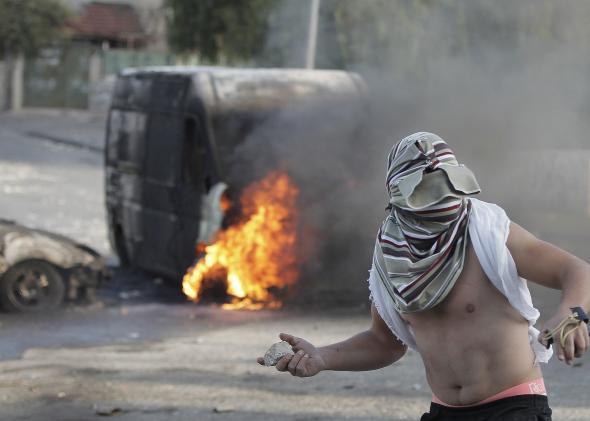There’s some depressing déjà vu in Palestinian President Mahmoud Abbas’ statement that Israel’s closure of the al-Aqsa mosque on Thursday constitutes an “act of war.” The phrase gets bandied about an awful lot in this conflict, including in reference to previous occasions when access to the mosque was restricted. This is in large part because the two sides frequently are in a state of war or something close to it. But the constant fever pitch rhetoric can also make it difficult to isolate the perpetual conflict’s real turning points.
The current outbreak of violence in Jerusalem is in response to the police killing of a suspect in the attempted assassination of far-right religious activist Yehuda Glick. The U.S.-born Glick is a leader of the campaign for Jews to be allowed to pray at the al-Aqsa compound—one of the city’s main religious flashpoints.
It’s not unusual for Israel to restrict access to the mosque, the third-holiest site in Islam. The New York Times reports, citing the Israeli interior ministry, that “Israel had restricted Muslim access, usually barring men under 50, on 40 occasions this year, up from eight days in 2013.” But this is believed to be the first time that the Temple Mount complex has been closed off entirely since Ariel Sharon paid it a controversial visit in 2000, the precipitating event behind the Second Intifada in which more than 1,000 Israelis and 3,000 Palestinians were killed.
Could something similar happen now? Some observers say that with historically high levels of rioting in recent days, Jerusalem already is experiencing a “silent intifada,” though the city’s police dismiss the idea, saying the situation is under control.
Abbas’s Fatah party has called for a “day of rage” tomorrow, a common term for Palestinian demonstrations, but the president has been adamant that he is not calling for another Intifada. “If we were calling for an intifada, we would have done so during the 50 days of Operation Protective Edge,” he said this week, referring to the summer’s war in Gaza.
At that time, too, there were fears of a third intifada, and Hamas explicitly called for one. But while there were several “days of rage” on the West Bank in solidarity with Gaza, these never turned into the widespread uprising that many were expecting.
There are a number of reasons for this. The Palestinian leadership isn’t as united and the populace is less well armed than in 2000. Other Arab governments, distracted by a myriad of other crises, aren’t as focused on the Palestinian issue as they used to be. (Though the al-Aqsa closure is likely to irritate the government of Jordan, the official custodian of Jerusalem’s Muslim holy sites, which has been coming under increasing pressure over its relations with Israel.) There has also not been much enthusiasm among Palestinian leaders for another intifada given that the violence of the previous two didn’t do much to advance the cause.
Another big difference is that Abbas is president today, not Yasser Arafat. The Palestinian foreign minister has gone on record saying, “as long as [Abbas] is in charge, there will be no third Intifada.” One possible reason for Abbas’s reluctance: a mass uprising could potentially be directed against the president’s Palestine Liberation Organization as well as Israel.
Things are likely to get uglier, with Friday in particular likely to see more violence. A lot will depend on how long Israel will keep the Temple Mount closed, and how far the Palestinian government will go in supporting mass demonstrations. Given the incentives here, there’s a good chance things might settle back down very quickly to the status quo—which is to say, a baseline level of sporadic violence and seething tension.
